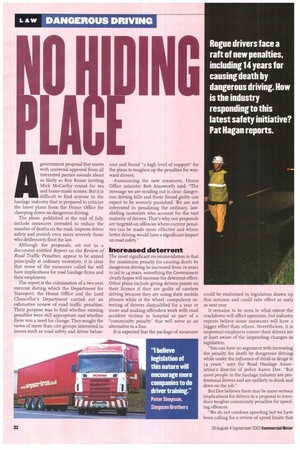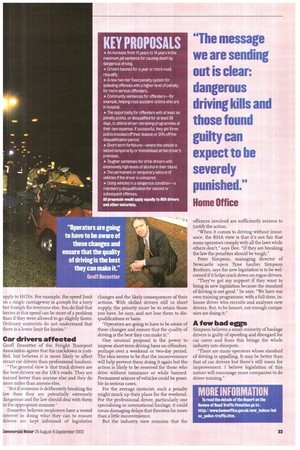lirolG
Page 32

Page 33

If you've noticed an error in this article please click here to report it so we can fix it.
Agovernment proposal that meets with universal approval from all interested parties sounds about as likely as Roy Keane inviting Mick McCarthy round for tea and home-made scones. But it is difficult to find anyone in the haulage industry that is prepared to criticise the latest plans from the Home Office for damping down on dangerous driving.
The plans, published at the end of July, include measures intended to reduce the number of deaths on the road, improve driver safety and punish even more severely those who deliberately flout the law.
Although the proposals, set out in a document entitled Report on the Review of Road Traffic Penalties, appear to be aimed principally at ordinary motorists, it is clear that some of the measures called for will have implications for road haulage firms and their employees.
The report is the culmination of a two-year exercise during which the Department for Transport, the Home Office and the Lord Chancellor's Department carried out an exhaustive review of road traffic penalties. Their purpose was to find whether existing penalties were still appropriate and whether there was a need for change. They sought the views of more than roo groups interested in issues such as road safety and driver behav iour and found "a high level of support" for the plans to toughen up the penalties for wayward drivers.
Announcing the new measures, Home Office minister Bob Ainsworth said: "The message we are sending out is clear: dangerous driving kills and those found guilty can expect to be severely punished. We are not interested in penalising the ordinary, lawabiding motorists who account for the vast majority of drivers. That's why our proposals are targeted on offences where current penalties can be made more effective and where better driving would have a significant impact on road safety."
Increased deterrent
The most signiticant recorrunendation is that the maximum penalty for causing death by dangerous driving be increased from io years in jail to 14 years, something the Government clearly hopes will increase the deterrent effect. Other plans include giving drivers points on their licence if they are guilty of careless driving because they are using their mobile phones while at the wheel, compulsory retesting of drivers disqualified for a year or more and making offenders work with road accident victims in hospital as part of a "community penalty" that will serve as an alternative to a fine.
It is expected that the package of measures could be enshrined in legislation drawn up this autumn and could take effect as early as next year.
It remains to be seen to what extent the crackdown will affect operators, but industry experts believe some measures will have a bigger effect than others. Nevertheless, it is important employers ensure their drivers are at least aware of the impending changes in legislation.
"You can have no argument with increasing the penalty for death by dangerous driving while under the influence of drink or drugs to 14 years," says the Road Haulage Association's director of policy Karen Dee. "But most people in the haulage industry are professional drivers and are unlikely to drink and drive on the job."
But Dee believes there may be more serious implications for drivers in a proposal to introduce tougher community penalties for speeding offences.
"We do not condone speeding but we have been calling for a review of speed limits that
apply to HGVs. For example, the speed limit on a single carriageway is 40mph for a lorry but 60mph for everyone else. You do find that Lorries at this speed can be more of a problem than if they were allowed to go slightly faster. Ordinary motorists do not understand that there is a lower limit for lorries."
Car drivers affected
Geoff Dossetter of the Freight Transport Association agrees that the crackdown is justified, but believes it is more likely to affect errant car drivers than professional hauliers.
'The general view is that truck drivers are the best drivers on the UK's roads. They are trained better than anyone else and they do more miles than anyone else.
"But if someone is deliberately breaking the law then they are potentially extremely dangerous and the law should deal with them in the appropriate manner."
Dossetter believes employers have a vested interest in doing what they can to ensure drivers are kept informed of legislative changes and the likely consequences of their actions. With skilled drivers still in short supply, the priority must be to retain those you have, he says, and not lose them to disqualifications or bans.
"Operators are going to have to be aware of these changes and ensure that the quality of driving is the best they can make it."
One unusual proposal is the power to impose short-term driving bans on offenders, perhaps over a weekend or two-day period. The idea seems to be that the inconvenience will help prevent them doing it again but the action is likely to be reserved for those who drive without insurance or while banned. Permanent seizure of vehicles could be possible in serious cases.
For the average motorist, such a penalty might muck up their plans for the weekend. For the professional driver, particularly one specialising in international haulage, it could mean damaging delays that threaten far more than a little inconvenience.
But the industry view remains that the offences involved are sufficiently serious to justify the action.
"When it comes to driving without insurance, the RHA view is that it's not fair that some operators comply with all the laws while others don't," says Dee. "If they are breaking the law the penalties should be tough.'
Peter Simpson, managing director of Newcastle upon Tyne haulier Simpson Brothers, says the new legislation is to be wet, corned if it helps crack down on rogue drivers.
"They've got my support if they want to bring in new legislation because the standard of driving is not good." he says. "We have our own training programme, with a full-time, inhouse driver who recruits and analyses new drivers. But, to be honest, not enough companies are doing it."
A few bad eggs
Simpson believes a small minority of haulage drivers is guilty of speeding and disregard for car users and fears this brings the whole industry into disrepute.
"There are many operators whose standard of driving is appalling. It may be better than that of car drivers but there's still room for improvement. I believe legislation of this nature will encourage more companies to do driver training."
















































































































































